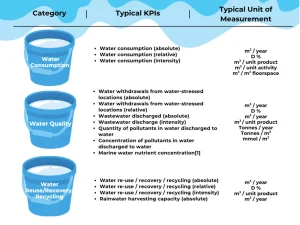The Cadlas Sourcebook on Investor Stewardship for Climate Resilience
The Cadlas Sourcebook on Investor Stewardship for Climate Resilience: A Practical Resource for Embedding Climate Resilience into Investment Practices
After extensive consultations across the investment industry, Cadlas is pleased to announce the release of our Investor Stewardship for Climate Resilience Sourcebook. This new resource provides a practical framework for investors to align their stewardship practices with climate resilience goals. It lays out how investors can diagnose and understand physical climate risks, prioritise engagement with vulnerable companies and assets, and provide stewardship that drives the adoption of best practices on climate resilience across portfolios.
As the physical impacts of climate change intensify, investors face a defining challenge and opportunity. From floods and wildfires to water stress and heatwaves, physical climate hazards are becoming more frequent, more severe and more financially material. In this context, investors are increasingly recognising that identifying and disclosing physical climate risks is no longer enough. What is required is a shift from risk awareness to resilience action integrated directly into the way investors engage with the companies and assets they own.
The Investor Stewardship for Climate Resilience Sourcebook fills a critical gap in the market for tools and guidance that move beyond disclosure toward actionable investor engagement. It does not seek to reinvent existing investment processes, but instead demonstrates how climate resilience can be embedded within them through flexible and adaptive engagement strategies.
Importantly, the sourcebook builds on the growing body of work developed by leading investment industry bodies in recent years, aiming to advance action by focusing on the specific role investors can play in shaping a climate-resilient real economy.
This work emphasises that promoting climate resilience is aligned with investors’ fiduciary duties, encouraging investors to remain engaged and support climate resilience through targeted stewardship. It also highlights the need for tailored strategies across asset classes and geographies, while offering a curated toolkit of key resources.
By focusing on stewardship as a key instrument for advancing climate resilience, the sourcebook spells out how investors can strengthen long-term performance, manage systemic risks, and contribute to a more resilient and inclusive economy.
As physical climate impacts continue to grow in scope and scale, collaborative stewardship will be essential for unlocking the capital, capabilities, and influence needed to drive meaningful change. The time for passive risk management has passed. Through the release of this sourcebook, Cadlas hopes to contribute towards more widespread investor action that treats climate resilience not as a niche concern, but a core investment imperative.
The Investor Stewardship for Climate Resilience Sourcebook is available for download now.
Cadlas is also pleased to announce our upcoming webinar “Investor Stewardship for Climate Resilience” scheduled for 1pm (BST) on July 16th 2025. Sign up here and stay tuned for more info!
Other Articles

Sustainability-Linked Financing for Climate Resilience (part 2)
In Part 1 of this Resilience Unpacked series on Sustainability-Linked Financing for Climate Resilience, we explored the largely untapped potential of sustainability-linked bonds (SLBs) and loans (SLLs) to drive progress on climate adaptation and resilience. Despite their success in supporting mitigation goals, our research found that these instruments have only rarely been used to target adaptation outcomes. However, the growing application of water-related KPIs in SLBs and SLLs may offer a meaningful entry point for change.
In Part 2, we dig deeper into how water-related KPIs and SPTs are currently used in SLBs and SLLs across different sectors. We’ll examine how these indicators map against industry benchmarks, any emerging trends and practices shaping this evolving landscape.
Assembling the Evidence Base
To understand current practices, we analysed a dataset of 151 SLBs and SLLs issued between 2019 and 2024 that included water-related KPIs. This data was sourced from the Environmental Finance Database. Our research focused on four water intensive but key priority sectors: i) agri-processing, ii) manufacturing & services iii) property & tourism and iv) primary agriculture. After filtering out instruments from sectors outside our scope and transactions without disclosed KPIs, we identified 36 relevant SLBs and SLLs comprising 20 bonds and 16 loans for further analysis.
These transactions span a range of sectors and geographies, offering valuable insight into how water-related targets are structured in real sustainability-linked finance deals. They also provide a practical foundation for assessing the ambition and comparability of these targets against established industry benchmarks.
Anchoring to Benchmarks: What’s Available and What’s Missing
One of the key challenges in assessing SPT ambition is the absence of standardised benchmarks across sectors. To address this, our analysis drew on several existing reference points:
- EU BREFs
These are comprehensive, technical resources that detail the Best Available Technologies (BAT) for a plethora of industries. While the focus is on integrated pollution prevention and control across industries, they often include information on energy, water use and wastewater management. These documents offer granular, production process level industry benchmarks that, while useful, require careful interpretation to avoid misapplication outside their specific industrial context. As a result, we based our analysis on BREF water benchmarks.
- Buildings industry benchmarks
We referenced environmental benchmarks developed by the Better Buildings Partnership (BBP) to support our analysis of the property & tourism sector. These provide practical environmental benchmarks for commercial buildings, such as offices and shopping centres. However, their specificity to commercial buildings such as office blocks and shopping malls means they are not directly applicable to other building types like residential buildings.
- Food & Agriculture Organisation (FAO) resources
We reviewed water-related data and guidance from the FAO AQUASTAT database as well as other FAO resources to support our analysis of the primary agriculture sector. While rich in information, methodological uncertainties around target-setting in primary agriculture prevented us from fully integrating these benchmarks into our analysis.
Water-Related KPI Categories in Practice
Our analysis revealed that water-related KPIs in SLBs and SLLs generally fall into three main categories: water consumption, water quality, and water reuse/recovery/recycling.

Water Consumption: These KPIs are the most widely used. These may be measured in absolute terms (e.g. cubic metres per year), in relative terms (e.g. percentage reduction in water consumption), or in terms of intensity – for example, water consumption per unit of product in manufacturing, per unit of activity in services, or per square metre in real estate. Some KPIs also focus specifically on water consumption from water-stressed regions, either in absolute or relative terms.
Water Quality: These KPIs tend to focus on the volume of wastewater discharged, either in absolute terms or in specific intensity terms and are commonly cited in BREFs. Some KPIs are qualitative and used to measure the wastewater pollutant load in terms of pollutant quantity or concentration.
Water Reuse/Recovery/Recycling: These KPIs are used in several sectors. These may be framed in absolute, relative, or intensity terms. A few transactions also include rainwater harvesting targets, although these are less common.
Table 1: Categorisation of water-related KPIs identified in the evidence base
Assessing Target Ambition: The Role of Second Party Opinions
In the absence of universally accepted benchmarks, SPTs in SLBs and SLLs are typically assessed by Second Party Opinion (SPO) providers. These providers use qualitative categories such as “insufficiently ambitious,” “moderately ambitious,” “ambitious,” and “highly ambitious” to rate the strength of a given target. While methodologies vary and are not always disclosed in full, two criteria consistently emerge.
First, SPOs often assess whether the target represents a meaningful improvement on the issuer’s past performance. This relies on transparent reporting of historic water use, which can be a challenge for some companies. Second, SPOs consider whether the target exceeds what is typical for the issuer’s sector. This comparative analysis depends on the availability of peer targets or recognised benchmarks, which are uneven across sectors.
Together, these criteria underscore the importance of both internal and external reference points in credible SPT design and the need for more consistent disclosure and benchmarking tools.
Sector-Specific Trends and Observations
The 36 SLBs and SLLs analysed reveal some important sector-level differences in how water-related KPIs and SPTs are used.
In the Agri-Processing sector, most water targets relate to consumption intensity, particularly in the beverage production sub-sector. Here, an ambitious target often involves a 10–20% reduction in water consumption intensity per unit (litre) of product. EU BREFs for the food, drink and milk industries also provide useful benchmarks for wastewater discharge intensity per unit of product, particularly in industries like brewing.
The Manufacturing & Services sector is highly diverse, spanning industries as different as pharmaceuticals, chemicals, paper & packaging, mining and logistics & services. Water KPIs here cover a broad range from water consumption in absolute terms in pharmaceutical production to wastewater discharge intensity in chemicals, plastics & rubber and paper & packaging, as well as water reuse/recovery/recycling in logistics & services. Given this diversity, setting credible targets requires deep industry-specific knowledge and benchmarking.
In the Property & Tourism sector, water consumption intensity is the dominant metric. Here, BBP benchmarks offer a relatively robust reference point for target setting. There is also at least one example of targets related to rainwater harvesting, although such these remain rare.
In contrast, the Primary Agriculture sector remains largely absent from the sustainability-linked finance landscape when it comes to water KPIs. Despite agriculture being the largest consumer of freshwater globally, our analysis found only one SPT in the livestock sub-sector, targeting absolute wastewater discharge. No examples were found for crop production despite it requiring the most significant amounts of water. While the ICMA KPI Registry provides many KPI recommendations, our research found little evidence of their practical use to set SPTs.
Looking Ahead
Our analysis across this Resilience Unpacked series highlights both the progress and the gaps in how water-related KPIs are used in SLBs & SLLs. While levels of rigour and benchmarking vary, what’s clear is that water offers a unique entry point for linking finance to resilience outcomes. Water is deeply connected to the impacts of climate change and increasingly measurable through performance-based metrics making it a natural candidate for integrating adaptation goals into mainstream financial instruments.
If we are to unlock the full potential of sustainability-linked finance for climate resilience, water-related KPIs could help lead the way. They offer a concrete, scalable foundation on which to build stronger, more credible frameworks that channel capital towards adaptation.
Thank you for following along with this Resilience Unpacked series on Sustainability-Linked Financing for Climate Resilience. Stay tuned for more from our Resilience Unpacked insights series and more!
Other Articles

Sustainability-Linked Financing for Climate Resilience (part 1)
Welcome to the second instalment of Resilience Unpacked, Cadlas’ insights series exploring key topics in climate resilience finance. In this edition, we examine sustainability-linked financing and its potential to support greater private investment in climate adaptation.
Results-based financing mechanisms such as Sustainability-Linked Bonds (SLBs) and Sustainability-Linked Loans (SLLs) tie financial terms to the achievement of sustainability goals. This creates incentives for companies to meet environmental performance targets. If structured around climate resilience-related Key Performance Indicators (KPIs), these instruments could channel much-needed private capital into adaptation measures at the corporate and entity level while setting powerful incentives for improving corporate performance on climate resilience.
Despite their growing popularity in supporting mitigation-focused corporate sustainability goals, SLBs and SLLs rarely incorporate adaptation and resilience objectives. This represents an underutilised opportunity to drive progress on adaptation and resilience. However, there may be important lessons from the application of sustainability-linked instruments in water-related investments that provide avenues for their potential role in financing climate resilience.
What are SLBs and SLLs?
Sustainability-Linked Bonds (SLBs) are general-purpose bonds that link financing terms, such as interest rates, to the achievement of predefined sustainability-related Key Performance Indicators (KPIs). If an issuer meets or falls short of its sustainability targets, financial terms may be adjusted accordingly.
Sustainability-Linked Loans (SLLs) function similarly but are structured as loans between a given lender and a given borrower, rather than bonds which are issued to raise funds from capital markets. Their terms also adjust based on performance against agreed sustainability KPIs.
Both instruments present an opportunity to incentivise investment in resilience by directly tying financing terms to progress on climate adaptation metrics. However, this opportunity has not been widely utilised across markets.
Limited Usage of Adaptation & Resilience Related KPIs
Despite the surge in sustainability-linked finance, adaptation KPIs remain strikingly rare. Research by Cadlas into global SLB issuances, using the Environmental Finance Database, found no examples of any specific adaptation or resilience KPIs included in global SLB issuances to date.
This trend was also observed in SLLs, with our research finding only one instance of climate adaptation as a KPI. HB Reavis, a UK-based real estate firm, secured a USD 32.4 million SLL in February 2024, which included a KPI linked to the number of EU Taxonomy-aligned buildings designed for climate adaptation. However, limited public information makes it hard to assess the robustness of this KPI.
This scarcity suggests potential uncertainty among issuers about how to define, implement, and measure adaptation KPIs. One key barrier is an unaddressed need for standardised guidance for adaptation-related KPIs in sustainability-linked finance.
Need for Clearer Guidance on Target Setting for Adaptation & Resilience
The International Capital Market Association (ICMA), a globally recognised standard-setting body, currently provides a limited number of KPIs that could convincingly be considered adaptation-related in the June 2024 iteration of its KPI Registry.
These are found in the Energy and Insurance (assets) sectors, representing only two out of ICMA’s twenty-six sectors. Within the Energy sector the adaptation-related KPI related to Share of energy produced in alignment with the EU Adaptation Taxonomy. While the KPI for the Insurance (assets) sector referred to the Proportion of invested assets managed with climate adaptation objectives.
Beyond these, ICMA lists three additional KPIs loosely linked to adaptation and all found within the Utilities (electricity) sector, but these lack clear resilience-focused outcomes. These include:
- Increase additional transformer capacity to facilitate interaction with the grid and integrate renewable energy generation,
- Increase power usage effectiveness/efficiency
- Renewable energy capacity (absolute or proportional).
This highlights the need for more detailed, targeted guidance on adaptation-related KPIs that are suitable for use in sustainability-linked debt instruments. Such guidance could build on existing best practices in financial sector adaptation and resilience metrics, such as the ARIC Adaptation & Resilience Impact Measurement Framework for Investors, developed in collaboration with UNEP-FI and Cadlas.
Water KPIs as a Proxy for Resilience in SLBs and SLLs
While adaptation-focused KPIs remain largely absent, water-related KPIs have gained significant traction, potentially serving as a stepping stone for broader resilience financing.
According to the Environmental Finance Database in 2024 there were:
- 43 SLBs valued at nearly USD 72 billion were issued globally with water-related KPIs by corporate borrowers
- The most common KPIs included water consumption reduction, efficiency improvements, and freshwater withdrawal reduction.
While several transactions did not specify precise bond KPIs, SLBs were categorised and grouped based on existing loan KPI details from the Environmental Finance Database and where possible, financing frameworks and other relevant publicly available documents.
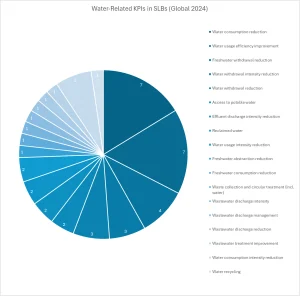
Water-Related KPIs in SLBs (Global Issuance, 2024)
The use of water-related KPIs appeared to be even more prevalent in SLLs, suggesting a stronger link between water management and this approach to sustainability-linked financing.
- 137 SLLs globally included water-related KPIs.
- The total lending volume of these SLLs reached USD 82.0 billion.
Of the one hundred and thirty-seven SLLs tagged by Environmental Finance as having water-related KPIs, only 121 could be categorised.
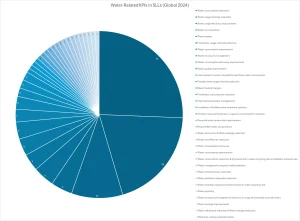
Water-Related KPIs in SLLs (Global Issuance, 2024)
Water-Related KPIs in the ICMA SLB KPI Registry
The water-related KPIs found in SLBs and SLLs from the Environmental Finance Database align closely with those listed in the ICMA SLB KPI Registry across a wide range of sectors including automotive, construction, energy, food and agriculture, finance, food & beverages, manufacturing, healthcare, maritime, metals & mining, retail, real estate, technology, transportation and utilities.
Across these sectors, water-related KPIs typically fall under six broad categories illustrated in the image below:
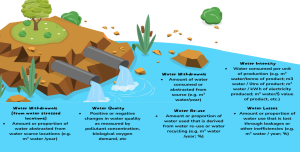
Six Categories in the ICMA SLB KPI Registry
These KPIs highlight the capacity for water to be used as a measurable, trackable and financeable resilience theme. However, while these KPIs offer a solid foundation, setting Sustainability Performance Targets (SPTs) against them remains a challenge.
From KPI to Impact: Driving Resilience & Improving Investor Confidence
Although water-related KPIs are common, the next hurdle is setting credible Sustainability Performance Targets (SPTs). SPTs tend to vary widely by issuer, sector and local context, and there is currently no standardised guidance for setting benchmarks or thresholds, especially for SLLs, where SPTs are rarely disclosed. This limits confidence and consistency across the market.
Despite this uncertainty around benchmarking & target-setting, SLBs still offer a powerful mechanism to incentivise financing broader resilience outcomes including water resource management.
The Anthropocene Fixed Income Institute (AFII) in their article ‘Rebuilding Confidence in the UK Water Sector,’ highlight the role SLBs can play in helping embattled UK water companies drive greater transparency on sustainability challenges, while also providing a financial hedge against poor performance for investors. AFII points out that by directly linking the cost of capital to measurable sustainability targets, water companies can improve investor confidence and build accountability.
Looking Ahead
At Cadlas, we are committed to driving innovation in sustainable finance that supports climate adaptation and resilience. One promising pathway lies in strengthening the design of SLBs and SLLs through more robust and relevant target-setting approaches. Developing clearer guidance for setting SPTs for water-related KPIs could be a practical and high-impact next step. This would not only reinforce the resilience link within SLBs and SLLs but also help build issuer and investor confidence in the adaptation value of these instruments.
By addressing these technical and strategic barriers, sustainability-linked finance can evolve into a more powerful mechanism for mobilising private investment in adaptation and resilience efforts. Water-related metrics, in particular, offer a compelling entry point for advancing this agenda. By anchoring SPTs in credible water-related KPIs, issuers can begin to demonstrate how sustainability-linked finance can deliver measurable adaptation outcomes. In doing so, they can help pave the way for wider market recognition of the role SLBs and SLLs can play in scaling climate resilience.
What’s Next?
In Part 2 of this Resilience Unpacked series on sustainability-linked finance, we’ll take a closer look at how water-related KPIs and SPTs are currently used in SLBs and SLLs across different sectors. We’ll examine how these indicators map against industry benchmarks, as well as analyse emerging trends and practices shaping this evolving landscape.
Other Articles

Cadlas Newsletter: April 2025 Issue
Welcome to the Cadlas Newsletter!
Welcome to the third issue of the Cadlas Quarterly Newsletter! Each issue will provide valuable insights into the latest trends and developments in climate resilience finance, covering topics such as sustainable bonds, climate resilience taxonomies, and more. This newsletter is also an excellent way to stay up-to-date on the Cadlas team and our work!

Cadlas recently hosted Resilience Unpacked: The Role of National Platforms in Unlocking Adaptation Investment, a timely webinar on moving from climate adaptation planning to financing.
The session featured rich insights from Nanki Kaur (ADB), Michael Mullan (OECD), Bouke de Vries (independent expert and former advisor to the Executive Board of Rabobank) and Danielle Evanson (Government of Barbados, Roofs-to-Reefs Programme), who shared practical insights on how national platforms can align public investment, mobilise private finance, and build systemic resilience.
Speakers emphasised the need to embed economic analysis into adaptation planning to demonstrate the benefits of proactive investment over the costs of inaction. They stressed the importance of integrating adaptation into public financial management systems, enabling stronger cross-government coordination, and designing institutional structures that can steer both public and private finance. Innovative financial instruments such as Barbados’ debt-for-nature and debt-for-climate swaps were showcased as examples of how to scale investment through coherent, nationally driven platforms.
Read more insights from the webinar here and click here to watch the webinar recording!

Represented by Senior Specialist for Climate Resilience, Noah Wescombe, Cadlas co-delivered the “Scaling Up Climate Adaptation Finance” workshop at the recently held UNEP-FI Regional Roundtable on Sustainable Finance for Latin America & the Caribbean in São Paulo, contributing to a dynamic regional dialogue on mobilising capital for climate resilience.
The session highlighted the need for locally relevant taxonomies, alignment with national policies and the integration of meaningful KPIs to drive accountability and impact. A clear takeaway was the power of collaboration in unlocking scalable adaptation solutions.
Cadlas has been actively working on this agenda and is currently collaborating with the Climate Bonds Initiative to advance the development of their Climate Bonds Resilience Taxonomy, a robust framework designed to guide and scale investment in climate adaptation across global markets. Read more insights from this workshop here.

Cadlas and ADB Explore Mechanisms for Scaling Up Climate Adaptation Investment
Cadlas, in collaboration with the Asian Development Bank (ADB), has analysed the potential for Project Preparation Facilities (PPFs) in supporting climate adaptation investments. This work examines the role of PPFs in catalysing adaptation finance in Asia and the Pacific.
The Asia-Pacific region faces a significant adaptation finance gap, with annual investment needs estimated between $102-431 billion, far exceeding the $34 billion in adaptation finance flows in 2021-2022. PPFs can help bridge this gap by providing technical and financial support to develop bankable adaptation projects.
The analysis profiles existing PPF initiatives in select ADB member countries to identify best practices and common challenges. It offers recommendations for scaling up effective PPFs, including ensuring operational flexibility and strategic alignment with national priorities, developing sustainable financing strategies, strengthening capacity building functions, fostering innovation, and addressing key implementation challenges. By supporting the development of a robust pipeline of investable adaptation projects, PPFs can help accelerate and scale up adaptation action in the region. The outputs of this work can guide ADB member countries and development partners in establishing and strengthening PPFs as an integral component of their adaptation finance strategies.
Stay tuned for the full release of this work in the form of a concept note on the ADB and Cadlas websites in the near future.

The real estate sector is highly vulnerable to climate change impacts ranging from the increasing occurrence of extreme heat events to more frequent damaging floods. In addition to the risks to real estate assets and investment portfolios, these also pose significant threats to livelihoods, well-being and health. Recent analysis by the influential think tank I4CE examines the role of the financial sector in helping to adapt the real estate sector to a changing and more extreme climate.
This calls for coordinated action across commercial banks, property insurance companies and asset management firms, both to support appropriately structured investments in real estate adaptation, and in providing financial services that improve the enabling environment for climate resilient investment in the sector.
Cadlas was pleased to contribute to this leading-edge analysis through expert reviewer inputs from our CEO Craig Davies, building on our first-hand experience of working with a range of financial institutions on climate resilience in the built environment.
The full report can be read here on the I4CE website.
From the Insights Blog:

In early March, Cadlas Analyst Aiesha Joseph attended Project Dandelion’s annual convening in Bellagio, Italy, where she joined leading women at the intersection of gender and climate justice.
The experience led to deep reflections on the links between climate resilience finance and gender equality, highlighting the significant challenges women face in accessing climate adaptation finance. This issue is particularly pressing in developing countries, where the adaptation finance gap remains vast. Aiesha also noted the limited integration of gender considerations in climate finance, with only a small portion of funds currently addressing these disparities.
Despite growing awareness, less than 5% of public adaptation finance in 2022 was gender-responsive, and only 1% of green, social, and sustainability bonds included gender objectives. To bridge this gap, Aiesha emphasises the need to rethink how we fund resilience by innovating inclusive financial tools, integrating gender into finance design, and improving data systems for tracking impact.
Read more of Aiesha’s insights here.
Cadlas in the News:

Investment in climate adaptation is being held back by fragmented, incremental planning, according to a recent Environmental Finance article covering Cadlas’ webinar, Resilience Unpacked: The Role of National Platforms in Unlocking Adaptation Investment. ADB’s Nanki Kaur highlighted that many National Adaptation Plans (NAPs) narrowly focus on production like seeds or water use while neglecting the full value chain, limiting investment appeal. For instance, Armenia’s resilient horticulture plans lacked market clarity, deterring banks. Bhutan offers a stronger model with its Climate Adaptation Investment Plan (CAIP), clustering actions into 11 water-sector packages with system-wide thinking and clear financing pathways, including private and blended finance.
To scale up climate adaptation financing through green bonds, clearer taxonomies and stronger public sector participation are essential, said the OECD’s Michael Mullan during Cadlas’ Resilience Unpacked: The Role of National Platforms in Unlocking Adaptation Investment webinar, as reported by Environmental Finance. Mullan emphasized that public issuers like France and MDBs such as the EBRD help build market familiarity. However, a key barrier remains knowing what qualifies as adaptation investment. The Climate Bonds Initiative’s new Resilience Taxonomy, launched in late 2024, aims to define eligible activities, reduce transaction costs, and help adaptation find its place in the growing sustainable bond market.

Opportunities for financing a climate resilient Scotland
In early March, Cadlas Analyst Aiesha Joseph attended a workshop hosted by the Scottish Government and ClimateXChange, focused on advancing climate adaptation finance in Scotland.
The event brought together academics, policymakers, and financial services to explore opportunities for tackling Scotland’s climate adaptation challenges. Discussions centred on innovative funding mechanisms, private and public sector collaboration, and how to align financial flows with adaptation needs to close the finance gap.

Cadlas @ London Climate Action Week
Exciting news, the Cadlas team will be attending LCAW 2025! Look out for more details soon on our LCAW events!
Other Posts

Insights from Resilience Unpacked: The Role of National Platforms in Unlocking Adaptation Investment
Insights from Resilience Unpacked: The Role of National Platforms in Unlocking Adaptation Investment
As climate risks intensify, the need to channel finance into adaptation has never been more urgent. Yet, despite more than a decade into formal national adaptation planning, implementation continues to lag behind. Cadlas’ recent webinar and panel discussion brought together leading experts Nanki Kaur from the Asian Development Bank (ADB), Michael Mullan from the Organisation of Economic Cooperation & Development (OECD), Bouke de Vries, independent expert and former advisor to the Executive Board of Rabobank and Danielle Evanson from the Government of Barbados’ Roofs-to-Reefs programme to explore how countries can and are already utilising national platforms to turn high-level adaptation policies into investment-ready strategies.
Unlocking the Potential of National Adaptation Plans (NAPs)
Nanki Kaur highlighted how National Adaptation Plans (NAPs) offer countries a structured way to assess climate risks and set sector-specific adaptation priorities. When done well, NAPs guide policy direction and investment planning, helping governments articulate both the urgency and strategic direction of their adaptation needs.
But turning these plans into investable projects is easier said than done. As Nanki pointed out, despite years of planning, adaptation financing remains elusive due in part to poor translation of climate risks into metrics that matter to investors. Many NAPs contain fragmented, small-scale solutions that fail to tackle adaptation at a systems level, and crucially, they’re often not well integrated into national public investment systems.
Making the Economic Case for Adaptation
Nanki also highlighted that one of the biggest challenges for countries has been demonstrating the value of adaptation. While there are many examples of economic modelling showing the costs of not adapting, very little analysis continues to be done on the benefits of proactive adaptation. This gap makes it harder for Ministries of Finance to justify adaptation investments or for private investors to see a business case for investing in adaptation.
To address this, ADB is supporting fourteen countries through its Climate Adaptation Investment Planning (CAIP) programme. This initiative focuses on aligning adaptation plans with public financial management systems and embedding economic analysis to assess the fiscal and financial returns of adaptation investment. This will in turn help governments to prioritise public funds where they are needed most, while steering viable projects towards private finance.
Building Institutional Architecture for Investment
Similarly, Michael Mullan underscored that effective adaptation planning requires robust cross-government coordination. While leadership often starts within specific ministries or agencies, unlocking finance and shifting national budgets requires collaboration from across all sectors and levels of government.
The OECD’s Climate Adaptation Investment Framework (CAIF) identifies six building blocks to integrate adaptation into investment planning including public finance mainstreaming, private investment support and sectoral regulation. To make this work, all parts of government need to be aligned. National platforms, Michael noted, can play a key role in strengthening institutional mechanisms, integrating climate risk into central government mandates and providing clearer planning signals to investors.
Lessons from Barbados’ Integrated Approach to Adaptation & Resilience
Danielle Evanson shared how Barbados is leading with an integrated, national platform approach through its “Roofs-to-Reefs” initiative. Rooted in the idea that climate resilience must stretch from households to coral reefs, the programme sits within the Prime Minister’s Office, enabling high-level coordination and oversight.
Roofs-to-Reefs operationalises adaptation planning by linking national policies, such as the Barbados Economic Recovery and Transformation (BERT) plan and Nationally Determined Contribution (NDC) with investment plans across six priority sectors including water, energy, waste, land use, ecosystems and housing. Importantly, this approach blends public and private investment, guided by a unified national vision.
Barbados has also turned to innovative financing tools to scale impact, structuring debt-for-nature and debt-for-climate swaps that mobilised investment from multilateral banks and domestic financial institutions. These mechanisms facilitated the establishment of the Barbados Environmental Sustainability Fund and the Blue Green Investment Bank, which is now in its operationalisation stage.
Engaging the Private Sector: Insights from the Netherlands
Bouke de Vries brought a unique perspective from the Netherlands Sustainable Finance Platform (SFP) convened not by a ministry, but by the Dutch Central Bank. The SFP aims to bring together stakeholders from the financial sector, government and scientific institutions to promote sustainability in the Netherlands. The platform makes recommendations for removing barriers to sustainable finance and is actively involved in pilots for sustainability initiatives.
In the SFP’s Climate Adaptation Working Group, members discuss what is needed to accelerate climate adaptation at the national level, with a particular focus on private sector stakeholders. Notably, this working group also includes the secretariat of the National Delta Programme’s commissioner.
Bouke highlighted that climate change poses a systemic risk which also affects the financial sector. It must therefore understand and manage these risks within its assets and client portfolios, with banks, insurers and institutional investors assessing, pricing, transforming, or avoiding them. Additionally, the financial sector contributes to adaptation and resilience by financing adaptation investments and insuring against risks. These are also important commercial opportunities.
Clear labels and taxonomies provide both urgency and clarity by helping to translate climate data into meaningful signals for market actors that can inform investment decisions. Well defined and actionable national adaptation strategies and targets are much needed to make adaptation more investable and bankable, as well as communication to businesses and people to raise awareness, enabling regulation and policies.
A Systems Shift Is Underway
If there was one overarching theme from the panel, it’s that climate adaptation can no longer be treated as an isolated policy issue. It must be understood as a systems issue, one that spans ministries, markets and entire economies.
Whether through national platforms like Barbados’ Roofs-to-Reefs, cross-sectoral coordination frameworks championed by the OECD, or regional investment planning supported by ADB, the shift from planning to financing adaptation is gaining traction. But for these efforts to succeed, countries must not only clarify their priorities they must also build the economic and institutional foundations that enable investment to flow.
Other Articles

Adaptation Finance becomes a highlight at UNEP FI Regional Roundtable
Adaptation Finance becomes a highlight at UNEP FI Regional Roundtable
Imagine a future where the financial sector is a powerful engine driving climate resilience across Latin America and the Caribbean. At Cadlas, we’re not just imagining it – we’re working to make it a reality!
Last week, our team had the privilege of helping to deliver the “Scaling Up Climate Adaptation Finance” workshop at the UNEP FI Regional Roundtable on Sustainable Finance in São Paulo. The room was buzzing with energy as participants from across the region came together to tackle one of the most pressing challenges of our time.

Collaboration is Key
Throughout the roundtable, we engaged in deep discussions on physical climate risk and adaptation finance.
A key takeaway? Collaboration is essential. By facilitating peer-to-peer dialogues and knowledge exchange, we saw firsthand how bringing diverse perspectives to the table can spark transformative ideas and solutions.
Piecing Together the Adaptation Finance Puzzle
So, what does it take to scale up adaptation finance? Our workshop participants identified several critical pieces of the puzzle:
- Locally-relevant taxonomies: Adaptation finance frameworks must be co-created with stakeholders to reflect the diverse realities on the ground.
- Alignment with policy: Embedding adaptation taxonomies within national policy instruments like NAPs is key for coherence and impact.
- Measuring what matters: Incorporating resilience and risk reduction KPIs into taxonomies can drive accountability and help track progress against adaptation goals.
- Growing the market: Capacity building and awareness-raising efforts are needed to position adaptation finance as a win-win for risk management and value creation.
Bridging Insights to Action
At Cadlas, we’re committed to turning these insights into action. That’s why we’re proud to be collaborating with the Climate Bonds Initiative on the groundbreaking Climate Bonds Resilience Taxonomy.
This taxonomy will provide a robust framework for identifying and scaling up climate resilience investments. And guess what? It’s grounded in the same principles of inclusivity, alignment, impact, and market development that emerged from the UNEP FI roundtable.
The Path Forward
As we continue to advance the Climate Bonds Resilience Taxonomy and engage with partners worldwide, one thing is clear: the sustainable finance community is a force to be reckoned with.
Together, we have the power to mobilize the capital needed to build a more resilient future for all. So, let’s keep breaking down silos, pushing boundaries, and daring to imagine a world where finance and sustainability go hand in hand.
Stay tuned for more updates on our work to scale up adaptation finance through the CAIL community of practice. And if you’re ready to join the movement, drop us a line! We’d love to explore how we can collaborate to drive climate resilience in Latin America, the Caribbean, and beyond.
Other Articles

National Platforms for Adaptation & Resilience (Part 2)
Welcome to the second instalment of Cadlas’ new insight blog series, Resilience Unpacked, where we explore key topics in climate resilience financing. In this edition, we focus on National Platforms for Adaptation and Resilience Investment.
National platforms or country platforms for climate action are country-led partnerships that align financing, coordinate stakeholders and connect national climate policies with financeable projects. They enhance collaboration, streamline funding and maximise climate impact by bridging the gap high-level national adaptation plans and financeable investments.
As demand for adaptation finance grows globally, national platforms are increasingly identified as important mechanisms for mobilising investment in climate adaptation and resilience initiatives. Strengthening and expanding these platforms will be key to transforming national climate policy ambitions into investable projects and unlocking the full potential of climate resilience investments for a more resilient future.
In Part 1 of our Resilience Unpacked series on national platforms, we explored exactly what they are and how they function. Now, we’ll take a closer look at their structure, organisation and the key stakeholders driving their work. Click here to read part 1 of this series
Structure of National Platforms for Adaptation & Resilience
As explored in Part 1, national platforms for climate action integrate climate considerations into investment pipelines by embedding them into strategy, operations and decision-making processes.
While there is no universal model, these platforms typically achieve their objectives by consolidating national climate priorities, supporting project preparation and capacity building, enhancing project pipeline management and mobilising innovative financial instruments.
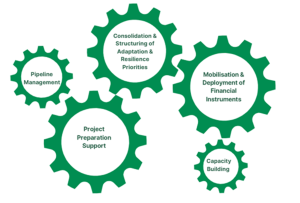
A defining characteristic of national platforms is that they are country-driven, meaning their structure varies based on national context. Despite differences in governance and institutional setup, these platforms generally engage a diverse set of stakeholders, including government entities, the private sector, civil society (including academia), and, in many cases, international organisations.
Stakeholder Roles in National Platforms
Stakeholders within national platforms work together to set the platform’s strategic direction, align investments with national adaptation priorities, mobilise funding, and develop investable adaptation project pipelines.
They also build institutional capacity, manage risks, coordinate community engagement to ensure local adaptation needs are met, and streamline funding between national governments and international financial institutions. These stakeholders generally fall into two main categories: leading and supporting stakeholders.
Leading Stakeholders
- Leading stakeholders play a key role in integrating national adaptation priorities into investment planning and financial supervision.
Supporting Stakeholders
- Supporting stakeholders help incorporate adaptation into sectoral investment planning and align community-level adaptation goals with national priorities.
- Depending on the institutional context, there may be other supporting stakeholders which contribute by managing risk and data, aligning projects with finance priorities, coordinating international funding, providing climate risk modelling, and promoting equity in adaptation efforts.
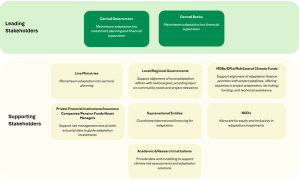
National Platforms in Action: Examples from Around the World
While national platforms have been widely used to support climate mitigation efforts, not many examples exist of their application in scaling up finance specifically for adaptation and resilience. However, international support for adaptation-focused national platforms is growing, with a consortium of MDBs publishing guiding principles for their development and implementation.
Key initiatives driving this momentum include the:
- Asian Development Bank’s (ADB) Climate Adaptation Investment Planning (CAIP) , which helps ADB partner countries translate national adaptation priorities into robust investment programmes by leveraging existing structures and strategies.
- International Monetary Fund’s (IMF) Resilience and Sustainability Facility (RSF ), which provides long-term financing to help countries strengthen economic resilience to climate risks.
As mentioned previously, the structure of a national platform varies based on country-specific needs and governance models. The following examples illustrate these differences, showcasing distinct stakeholder roles and levels of involvement.
The Netherlands Sustainable Finance Platform
Chaired by the De Nederlandsche Bank (DNB), the Netherlands’ Sustainable Finance Platform (SFP) is a great example of a financial sector driven national platform. The SFP brings together stakeholders across the financial sector including asset managers, the Dutch Banking Association, insurers and pension funds to work with government ministries to promote sustainability in the Netherlands through its financial sector.
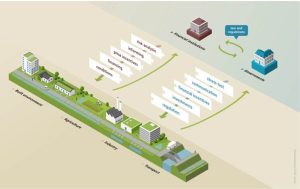
A core feature of this platform is its working groups, which shape the platform’s thematic focus. Importantly, the SFP features an Adaptation Working Group which examines how the financial sector can support economic adaptation to climate change in four key sectors: built environment, agriculture, industry and transport. The group assesses scenarios, methods, and data required for financial institutions to evaluate climate risks and adaptation needs. While its outcomes are non-binding, its recommendations play an important role in strengthening collaboration between financial institutions, the government, and other stakeholders, ensuring that adaptation challenges are linked to financial sector actions.
The Bangladesh Climate and Development Platform
Bangladesh is among the most climate-vulnerable nations, making climate adaptation finance an urgent priority. Launched in 2023, the Bangladesh Climate and Development Platform (BCDP) is a government-led initiative established in collaboration with international financial institutions, bilateral donors, and the private sector. While not exclusively focused on adaptation and resilience, the platform aims to generate a robust pipeline of climate projects and financing strategies.
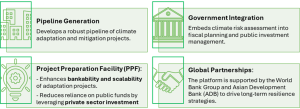
Building upon financing from long-term international development financing partners and an arrangement with the IMF’s Resilience and Sustainability Facility, the BCDP aims to improve the integration of climate risks into fiscal planning, enhance climate-sensitive public investment management and strengthen climate-related risk management for financial institutions. Under the BCDP, a project preparation facility will also be established to enhance project bankability, making climate projects more scalable and attractive to private investment.
The Way Forward for National Platforms for Adaptation & Resilience
By streamlining stakeholder collaboration, national platforms have become important mechanisms for mobilising finance for adaptation & resilience. The examples of the Netherlands and Bangladesh highlight how platforms can be tailored to meet country-specific needs to build resilience to the growing challenges of climate change.
As the demand for adaptation finance continues to rise, the success of these platforms will depend on strong, inclusive partnerships and a clear focus on locally led solutions.
This concludes our Resilience Unpacked series on National Platforms for Adaptation & Resilience. Thank you for joining us on this deep dive into national platforms and stay tuned for more from the Resilience Unpacked blogs series!
Other Articles

Cadlas Newsletter: January 2025 Issue
Welcome to the Cadlas Newsletter!
Welcome to the second edition of the Cadlas Quarterly Newsletter! Each edition will provide valuable insights into the latest trends and developments in climate resilience finance, covering topics such as sustainable bonds, climate resilience taxonomies, and more. This newsletter is also an excellent way to stay up-to-date on the Cadlas team and our work!

Global Environment Facility’s (GEF) Climate Adaptation Innovation & Learning Project Launch
In vulnerable developing countries, private investment in climate adaptation falls short of needs due to barriers like limited climate data, unclear impact metrics, and a lack of collaborative frameworks. The Climate Adaptation Innovation Learning (CAIL) project tackles these issues by fostering innovation and private sector engagement, connecting financial stakeholders in climate-vulnerable regions through three Communities of Practice (CoP).
Cadlas is pleased to serve as the technical partner for the Climate Change Adaptation Information Flows & Impact Measurement CoP, which focuses on consolidating and enhancing the understanding and use of climate-related information flows, empowering the financial sector to make scalable, impactful adaptation investments.
CAIL is financed by the Global Environment Facility and implemented by the UNIDO in partnership with Climate-KIC, Global Adaptation & Resilience Investment Working Group (GARI) and United Nations Environment Programme Finance Initiative (UNEP FI).

Cadlas is especially proud to see Barbados at the forefront of implementing innovative climate finance solutions for climate resilience such as the world’s first debt-for-climate swap. Supported by the Inter-American Development Bank, the European Investment Bank and commercial banks, this transaction swaps Barbados’ sovereign debt for more affordable financing, unlocking $125 million in fiscal savings which will be used to enhance water security and climate resilience.
Cadlas has previously collaborated with the Inter-American Development Bank on sustainability-linked sovereign debt instruments. This explored how sovereign debt management can be aligned with national climate resilience priorities and outlined a model for climate resilience performance measurement and target-setting. We are thrilled to see these ideas in action, paving the way for other climate-vulnerable nations to enhance resilience.

The financial sector is increasingly recognizing the emerging opportunities tied to climate adaptation and resilience. While progress has been made in improving the level of private sector investment, much more is needed to create the enabling conditions for a thriving adaptation and resilience market.
Cadlas is proud to have contributed to the development of the ‘Call for Collaboration’ recommendations, formulated during roundtable discussions hosted by the Atlantic Council’s Climate Resilience Center and the High-Level Climate Champions with public and private sector stakeholders. These recommendations outline six key actions to create enabling environments for mobilizing private finance for adaptation and resilience.

The potential for sustainable bonds to support the scaling up of financing for climate resilience took a major step forward in November, when the state of California approved a proposition for a USD 10 billion bond issuance to raise finance for responding to the impacts of climate change. These funds will be used to raise finance for investments that build resilience to a range of climate change impacts that California faces – many of which were brought into sharp focus through the devasting wildfires that destroyed thousands of homes in the Los Angeles area during January 2025.
While the bulk of the funds (USD 3.8 billion) will go towards water sector investments such as improving water quality, coping with floods and droughts, and the restoration of freshwater bodies such as rivers and lakes, a number of other climate resilience priorities are also covered. These include allocations of USD 1.95 billion for coping with wildfires and extreme heat, USD 1.9 billion for protecting natural habitats and wildlife, and USD 1.2 billion for coastal and marine protection, as well as funding for clean energy and agricultural projects.
From the Insights Blog:

Introducing Resilience Unpacked, Cadlas’ insight blog series providing an in-depth exploration of key topics in climate resilience financing. This first instalment will focus on national platforms and their role in mobilising finance for climate resilience.
National platforms for climate action are increasingly being recognised as important mechanisms for advancing national climate adaptation goals. These government-led partnerships foster collaboration among development partners and other stakeholders, aligning efforts with a shared strategic vision and national priorities. These platforms are essential for mobilising and directing finance towards investments that align with national adaptation and resilience priorities, fostering both focus and a sense of ownership over these priorities.
Read more here to learn how these platforms can help to mobilise finance for adaptation by bridging the gap between high-level national adaptation plans and financeable investments.
Cadlas in the News:

Responsible Investor: Adapting to the New Climate Realities
In a recent interview with Responsible Investor, Cadlas CEO Craig Davies highlighted the importance of clear, widely recognised definitions of adaptation and resilience, such as those outlined in the Climate Bonds Resilience Taxonomy (CBRT), in attracting private investment to the space. By specifying what qualifies as an adaptation activity, the CBRT seeks to empower bond issuers to design innovative financial instruments that inspire investor confidence. Davies also expressed his optimism that the CBRT would play a pivotal role in boosting private sector engagement in financing climate adaptation and resilience initiatives.

Check Out Our New Website
We’re excited to announce that our website has a brand new look! Check it out here!
Other Posts

National Platforms for Adaptation & Resilience (Part 1)
Welcome to the first instalment of Cadlas’ new insight blog series, Resilience Unpacked, where we explore key topics in climate resilience financing. In this edition, we focus on National Platforms for Adaptation and Resilience Investment.
We’ll explore how these platforms can serve as crucial mechanisms for financing climate adaptation and resilience initiatives. Specifically, we’ll define what they are and examine how they function, while highlighting the key role they can play in mobilising finance for adaptation and resilience.
What Are National Platforms and Why Do They Matter for Adaptation & Resilience?
National Platforms for climate action, or more commonly called country platforms, are government-led partnerships that bring together multiple stakeholders including the private sector and development finance partners to coordinate efforts, align financing and support national priorities. They act as investment coordination hubs, connecting national climate policies with financeable projects by fostering collaboration, streamlining funding and enhancing the impact of climate-focused development initiatives.
Mobilising Finance for Adaptation & Resilience
Regarded as key coordination mechanisms, national platforms have begun to play an increasingly vital role in advancing national climate goals. Their significance was underscored in the United Nations Framework Convention on Climate Change’s (UNFCCC) 2023 Global Stocktake, where they were highlighted as instrumental in facilitating the implementation of the third round of Nationally Determined Contributions (NDCs). But how do they relate to adaptation and resilience?
While many of these platforms focus primarily on climate mitigation, such as the International Partners Group (IPG) supported Just Energy Transition Partnership (JETP), national platforms also have the potential to play a crucial role in scaling up and mobilising finance for adaptation and resilience. They can offer focus and ownership over national and local adaptation priorities and coordinate investment efforts by bridging the gap between high-level adaptation strategies, like National Adaptation Plans (NAPs), and financeable investments.
The diagram below illustrates how national platforms can utilise country-level strategies to align financial flows with adaptation needs:

Mainstreaming Adaptation & Resilience Across the Investment Pipeline
National platforms mainstream adaptation and resilience considerations across the investment pipeline by integrating it into their strategy, operations, and decision-making processes. They achieve this via three key functions: Strategic Planning & Policy Integration, Investment Structuring & Financial Alignment, and Enabling Environments & Capacity Building.
The diagram below illustrates how national platforms function by integrating and mainstreaming adaptation and resilience considerations across the investment pipeline:
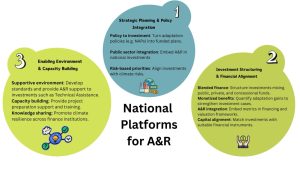
Strategic Planning & Policy Integration
National platforms play a vital role in turning national adaptation policies into investable plans and mobilising the necessary domestic and international resources. They create opportunities for government bodies, such as finance ministries, to collaborate with key stakeholders, ensuring adaptation and resilience are embedded into public investment programmes. By translating physical climate risks into investment priorities, they help develop pipelines that align with the risk-return expectations of financiers, making adaptation a more attractive and viable investment.
Investment Structuring & Financial Alignment
National platforms support the structuring of investment programmes that blend public, private and concessional finance to crowd-in commercial capital and ensure that investments meet investor requirements. They also help capture and monetise the full range of adaptation benefits including avoided losses, enhanced resilience and broader sustainable development benefits, strengthening the business case for investment. They also facilitate the integration of adaptation and resilience metrics into investment appraisal frameworks, ensuring that projects can be matched with the right financial instruments and capital types, making it easier to mainstream adaptation into investment decisions.
Enabling Environment & Capacity Building
Beyond finance, national platforms help establish the necessary, enabling environment for adaptation investment through facilitating technical assistance, promoting the development of metrics/standards and promoting the integration of adaptation and resilience into financial supervision. They also play a key role in supporting project preparation, building institutional capacity and fostering knowledge sharing across the financial sector.
Looking Ahead – Strengthening National Platforms for Climate-Resilient Growth
In conclusion, national platforms have the potential to be powerful drivers of adaptation and resilience finance, turning policy ambitions into investable projects.
By integrating adaptation and resilience considerations across the investment pipeline, they foster collaboration, align financial flows and embed adaptation and resilience into national investment decision-making. As the need for adaptation finance continues to rise, strengthening and expanding these platforms will be key to unlocking the full potential of climate resilience investments and building a more climate-resilient future.
To scale climate adaptation finance, national platforms must:
- Expand beyond being primarily mitigation-focused and fully integrate adaptation & resilience
- Align financial flows with adaptation goals for long-term climate security
- Strengthen cross-sector collaboration to foster holistic adaptation strategies
By providing a holistic overview of key stakeholders’ inputs and country needs, national platforms help direct financial flows and facilitate partnerships.
In part 2 of this Resilience Unpacked series on National Platforms, we’ll dive deeper into how National Platforms are structured and organised, and the various kinds of stakeholders that are involved. Stay tuned!
Other Articles

Internship: Climate Resilience Financing (2025 Update)
Internship: Climate Resilience Financing

About Cadlas
Cadlas is a dynamic start-up advisory practice focused on the rapidly expanding field of climate resilience financing. Our mission is to help build a climate resilient future, by helping capital to flow towards activities, assets and technologies that build resilience to the impacts of a changing and more variable climate.
We advise businesses, financial institutions, investors, markets, regulators, policymakers and international organisations on climate resilience analytics, definitions and mechanisms, on climate resilience impact and strategy, and on the evolving regulatory landscape. Our work ranges from bond markets and impact investing, to investment strategy and financial supervision, and beyond.
Climate resilience (or adaptation) financing is vitally important and yet currently under-developed area of sustainable finance. At Cadlas we focus on impactful, practical, and market-relevant approaches to problem-solving and innovation in this area.
About The Role
This is a unique and outstanding opportunity for a recent graduate candidate looking for an entry-point and exposure to the field of climate resilience & adaptation financing.
• You’ll have a passion for climate resilience, climate action and sustainability, and a solid understanding of climate change impacts and their significance for economic activity and financial markets.
• You’ll be comfortable working in a dynamic, fast-paced environment with the ability to deliver work to tight timelines.
• You’ll be resourceful, a quick learner with a good eye for detail, able to take initiative and work both independently and as part of a team and have excellent communication skills.
• You’ll be hardworking and committed to delivering work to a high standard.
You will work in a small and dedicated team that leads on innovative approaches to scaling up the quantity and quality of climate resilience & adaptation financing, working alongside a broad range of stakeholders across the climate science community and the financial sector. This is a unique opportunity to be involved in projects that have a significant impact on how private finance is mobilised towards climate resilience & adaptation internationally. You will also have the opportunity to build your network in a specialised and technical area of climate finance.
What You'll Be Doing
As an intern at our company, you will gain valuable hands-on experience over six months supporting client projects and research. Key responsibilities include:
• Conducting research and analysis on climate physical risk and resilience/adaptation topics to inform our work. This may include:
• Researching integration of climate resilience & adaptation criteria and objectives into target-setting and investment decisions in the financial industry, particularly in the context of the climate strategies of private financial institutions.
• Synthesizing lessons from development finance on effective mobilization of climate resilience & adaptation finance in lower-income countries, including useful case-studies that illustrate them.
• Analysing gaps and opportunities for multilateral banks and climate funds to increase support for climate resilience & adaptation finance.
• Tracking approaches to physical climate risk integration into climate resilience & adaptation planning at different market levels and sectors.
• Assisting with report writing and presentation development
• Gathering and organizing new data in spreadsheets and databases, including creation of data visualizations and summaries where relevant
• Learning about our consulting processes and methodologies, and how they can vary dynamically across our clients
• Thinking creatively about solutions to climate resilience & adaptation finance problems and brainstorming with the team where opportunities arise.
This internship will provide you with practical experience in sustainability consulting and the opportunity to apply your academic knowledge, collaborating with members of our team.
What You'll Bring
• Passion for environmental issues and sustainability
• Strong analytical and critical thinking skills
• Proficiency in Microsoft Office applications, especially Excel
• Excellent written and verbal communication abilities
• Detail-oriented with good organizational skills
• Some coding experience (e.g. python, JS) and/or basic proficiency with relevant software (e.g. GIS) would be a plus
• Previous internship experience in a related field would be a plus
As an intern, you will gain valuable experience to complement your graduate studies. This is an excellent way to expand your knowledge and jumpstart your career in sustainability.
To be successful you will need to be highly detail-orientated and able to produce high-quality outputs, take initiative to solve problems and be comfortable with a fast-paced start up environment.
Location
Hybrid (remote working / Cardiff office)
Start Date
As soon as possible
Role
Six month fixed-term contract
Salary
£28,000 (pro-rata over six months)
LOCATION
Cardiff / flexible hybrid working
REPORTING TO
CEO
SALARY
from £30,000 to £35,000 depending on skills and experience
APPLICATION DEADLINE
1 March 2024
To apply – please submit your CV and a short cover letter (of no more than two sides) to [email protected]
Your cover letter should include details of:
• your relevant work / educational experience.
• your skills and in particular your experience in undertaking research tasks, conducting analysis, writing reports and/or briefings.
• how you meet the broader requirements of the role.
CVs without a cover letter will not be considered.
The closing date for applications is 9am UK time on 1 March 2024.
Please note:
• If you do not already hold the right to work in the UK and/or require sponsorship in order to continue working here, you should think carefully before applying. Unfortunately, Cadlas cannot guarantee visa sponsorship to candidates for this position.
• Cadlas is an equal opportunity employer and we value diversity. If you are invited to interview and need any reasonable adjustments during the interview process, please let us know.






